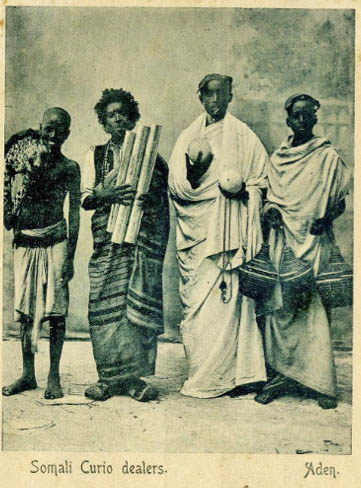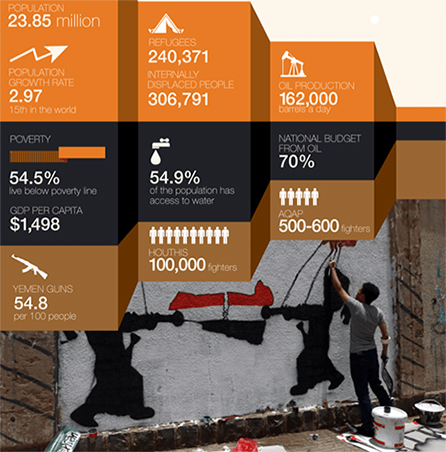There are many postcards on the Internet from old Aden under British control. Aden has long been a crossroads between Africa and Asia. It is not surprising that a number of early postcards feature Somalis in Yemen.


There are many postcards on the Internet from old Aden under British control. Aden has long been a crossroads between Africa and Asia. It is not surprising that a number of early postcards feature Somalis in Yemen.



يقرب الله لي بالعاÙيه والسلامه … وصل الØبيب الأغن
ذاك الØبيب الذي Øاز الØلا والوسامه … وكل معنى Øسن
ونسأل الله تعالى عودنا من تهامه … الى سÙØ ØµÙ†Ø¹Ø§Ø¡ اليمن
لأن صنعا سقاها الله Ùيض الغمامه … منزل Øوت كل ÙÙ†
ما مثل صنعاء اليمن … كلا ولا أهلها
صنعاء Øوت كل ÙÙ† … يا سعد من Øلها
تطÙÙŠ جميع الشجن … ثلاثَ ÙÙŠ سÙØها
الماء وخضرة رباها الÙايقه والوسامه … وكل معنى Øسن
كم يضØÙƒ الزهر Ùيها من دموع الغمامه … Ùيا سقاها وطن
يا ليت شعري متى الأيام ØªØ³Ù…Ø Ø¨Ø±Ø¬Ø¹Ù‡ … إلى مدينة أزال
ونستعيد ما مضى يا سيد Ø£Ùديك جمعه … وطيب بساط المطال
لأن من بعدكم ما ك٠لي قط دمعه … والشوق بي لا يزال
وكلما غردت ورقاء بأعلى البشامه … طلقت طيب الوسن
أهيم ÙÙŠ عشقتك … والدمع جاري غزير
ÙˆØ§Ù„Ø±ÙˆØ ÙÙŠ قبضتك … وانا بØبك أسير
والقلب من Ùرقتك … يكاد Ù†Øوك يطير
ÙارØÙ… أسير الهوى من قد تزايد غرامه … إن لم تكن له Ùمن
لأنني لا أطيق الهجر ذا والعدامه … ولا Ø£Øتمل ذا الشجن
تظن يا منيتي ان قد نسيت أو تناسيت … او خنت عهدي القديم
شاØل٠براسك بأني Ùيك من Øين وليت … أبكي Ùˆ ساعه واهيم
ولا Øلى لي سواك Ùˆ لا بغيرك تسليت … يمين والله عظيم
يا ناس ما Øيلة المشتاق ÙÙŠ ريم رامه … ما Øيلة ابن الØسن
يا ربنا يا مجيب … عجل لنا بالرواØ
لوصل ذاك الØبيب … بالأنس والإنشراØ
والدهر ذاك الكئيب … قد تقضًى وراØ
سهل لنا منك باللط٠الخÙÙŠ والكرامه … وعاÙنا واع٠عن
صلي وسلم على طه Ø´Ùيع القيامه .. والأل ما المزن شن

By Sheila Carapico, Middle East Research and Information Project, July 14
* This memo was prepared as part of the “Ethics and Research in the Middle East†symposium
American political scientists studying the Middle East face ethical dilemmas not shared by most of our disciplinary colleagues. Sometimes – perhaps unexpectedly – our presence in countries or communities experiencing repression and/or political violence puts our local colleagues, hosts, or contacts at risk by association. The massive U.S. military footprint and widespread mistrust of U.S. policies and motives multiplies the risks to our interlocutors.
The trademark methodology of American Arabists is fieldwork, meaning, in political science, in-depth interviews, participant observation, data collection, document-gathering, opinion polling, political mapping, and recording events. As sojourners but not permanent residents, we rely heavily on the wisdom, networks, and goodwill of counterparts “on the ground,†particularly other intellectuals.
In any environment where agencies of national, neighboring, and U.S. governments are all known to be gathering intelligence, our research projects may look and sound like old-fashioned espionage. Even under the very best of circumstances (which are rather scarce) a lot of people are wary or suspicious of all Americans, including or sometimes especially Arabic speakers who ask a lot of questions and take notes. Immediate acquaintances probably grasp and trust our inquiries. Their neighbors or nearby security personnel may not. It is common knowledge that at least some spies and spooks come in academic disguise and that some U.S.-based scholars sell their expertise to the CIA or the Pentagon. Instead of treating whispered gossip as the product of mere paranoia or conspiracy theories, we need to recognize its objective and sociological underpinnings. Continue reading On The Moral Hazards of Field Research in Middle East Politics

If you take the time to check the “Spam” folder in your email accounts, you will undoubtedly find quite a few solicitations for getting money out of a foreign account. Usually it is the widow of a former dictator in Nigeria, a lawyer for a deposed general or even winning the lottery in Barcelona. Recently I noticed a purported message from a U.S. army officer in Afghanistan who wants to get money out of there. But for the first time I received a message from a “Yemeni”, fictitious as it obviously is and certainly not from an email account (chukwudouglasekp2@yahoo.com.hk) in Yemen. Here is the message:
Hello Dear
My name is Mr.Al-Hawshabi Karim , A Yemen national I have been diagnosed with Oesophageal cancer .It has defiled al forms of medical treatment, and right now I have only about a few months to live, according to medical experts. I have not particularly lived my life so well, as I never really cared for anyone(not even myself) but my business.
Though I am very rich, I was never generous, I was always hostile to people and only focused on my business as that was the only thing I cared for. But now I regret all this as I now know that there is more to life than just wanting to have or make all the money in he world. Continue reading Spam, Spam and more Spam (but from Yemen?)

Changing Tactics & Motives – Kidnapping of Foreigners in Yemen 2010-2014
A study conducted by Safer Yemen.
EXECUTIVE SUMMARY
From 2010 to March 2014 there have been 47 realised kidnapping cases and more than 76 foreign victims held by kidnappers in Yemen. The country has witnessed a dramatic increase in kidnappings in this period, going from only one incident in 2010 to 19 in 2013, the highest number of incidents recorded in one year since the kidnapping of foreigners started in Yemen in the late-1980s.
The kidnappings in Yemen can be broken down into three different types: tribal, political and criminal. Each type involves a distinct set of perpetrators, motives and tactics; however, in the past three years these have often overlapped and the actors and motives of a kidnapping are often blurred. Prior to 2011, almost all kidnappings were tribal, with only one case of criminal kidnapping and very few political kidnappings. Post-2011, most kidnappings have been criminal and political and with high impact due to increased levels of violence, prolonged captivity, ill-treatment of victims and complex negotiations.
There are a number of reasons behind this trend, which have emerged from the political crisis in 2011 and the subsequent political transition. First, the Yemeni state’s capacity to provide security throughout the country has been severely restricted since 2011. Second, in parallel to tribal kidnappings in rural areas, a new form of criminal and political kidnappings in urban centres has emerged in recent years and has specifically targeted the international community and served as a political pressure tool. Third, the lack of political, legal or military consequences for kidnappers has inspired more actors to get involved. Fourth, the payment of high ransoms in several high-profile kidnapping cases involving European citizens has contributed to a perception that kidnapping is a highly lucrative activity. Continue reading Kidnapping of Foreigners in Yemen 2010-2014

When I first arrived in Yemen, early in 1978, I found a virtual janna, a country building itself up by the sandalstraps, people who were welcoming, tribesmen who did more than wear their honor on their sleeves, a sense that the future would bring good things. It was not a land frozen in time, despite the lack of infrastructure and Western amenities, but a force for change as Yemenis took to entrepreneurship as second nature (which it, of course, always was). Development was in the air and on the ground, as bilateral and United Nations agencies poured money into Yemen, much of it ineffectual and wasted. In 1978 USAID was sponsoring a major sorghum improvement project in Yemen, a boondoggle that did little more than collect seeds for the University of Arizona’s seed bank. Given what I learned about Yemeni farmers’ knowledge, they should have been giving advice to the United States on how to grow sorghum. Much ado was made about building up the capacity of the central government, although the money flowing in through the various programs invited corruption rather than sustainable growth. Still, I have felt over the years that Yemenis, by and large, have the resolve and grit to persevere.
In the past three and a half decades Yemen has experienced ups and downs. A population estimated around 6 million or less back then has skyrocketed to some 24 million today. With the decline in subsistence agriculture, which at least filled stomachs, poverty and malnutrition are greater today than they were in 1978. The devastating loss of remittance wealth, which fueled Yemen’s grass-roots development in the 1980s, has led to chronic unemployment. The much touted unification in 1990, a kalashnikov wedding in hindsight, could not overcome the power politics and regional rivalry that have played out in the last two decades. The removal, or at least side-lining, of Ali Abdullah Salih has thus far not resulted in progress towards a peaceful solution to Yemen’s agonizing conflicts. The problem is not so much the inability of Yemen to renew itself, but the continual interference from outside forces. Continue reading Yemen from Janna to Jahannam

Al Jazeera has just released a “Yemen Infographic” with basic details on Yemen’s statistics and political situation. Check it out here.